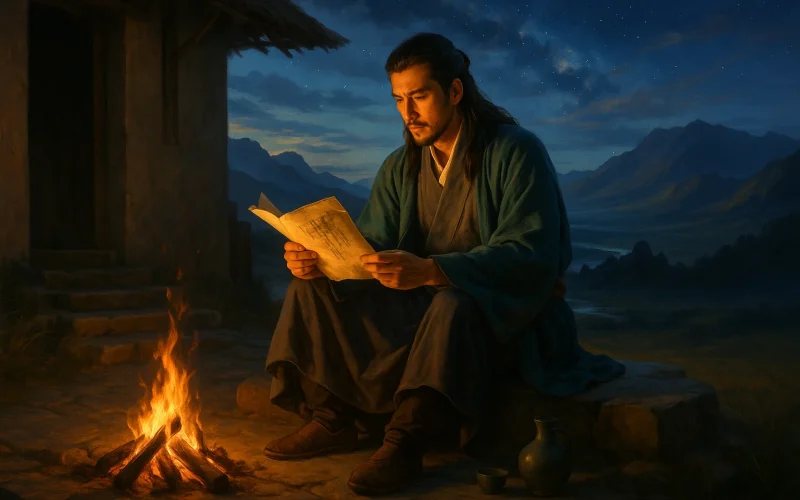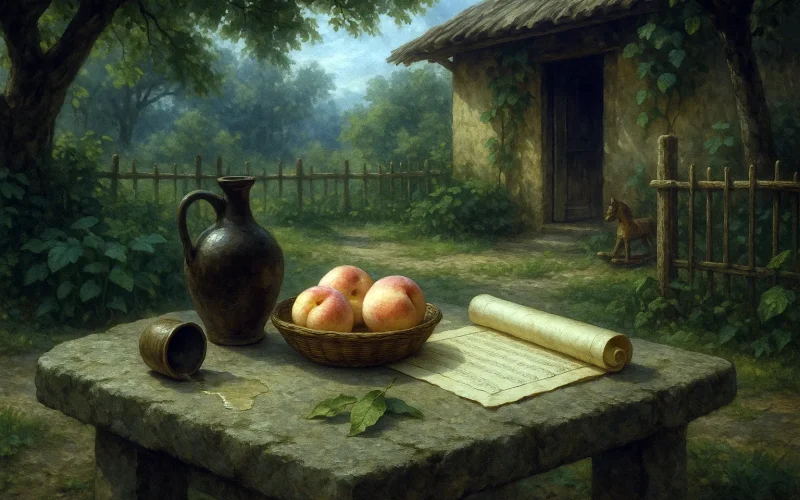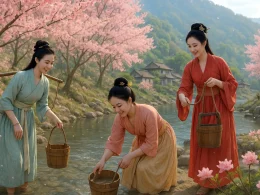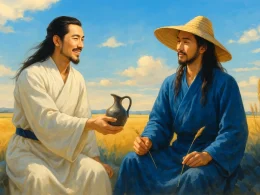Far, far away ancient emperors' days,
No one still lives in their natural ways.
Confucius taught disciples without rest
To purify the world from east to west.
Though the auspicious bird did not alight,
They tried still to renew music and rite.
But two River songs were not heard to sing,
The stream of time passed till the tyrant king,
Who ordered Books of Poetry should be burned
And no more classics should again be learned.
Only a few old scholars tried to spread
The six Confucian classics to be read.
Why then after the Han Dynasty's fall
Would no scholar study Six Books at all?
So many chariots run all the day long,
But nowhere is heard the sagacious song.
If I did not drink my fill, flee from care,
Could I be worthy of the hood I wear?
But I regret the mistakes I have made.
Would you forgive what a drunkard has said?
Original Poem
「饮酒 · 其二十」
陶渊明
羲农去我久,举世少复真。
汲汲鲁中叟,弥缝使其淳。
凤鸟虽不至,礼乐暂得新。
洙泗辍微响,漂流逮狂秦。
诗书复何罪,一朝成灰尘。
区区诸老翁,为事诚殷勤。
如何绝世下,六籍无一亲。
终日驰车走,不见所问津。
若复不快饮,空负头上巾。
但恨多谬误,君当恕醉人。
Interpretation
Composed during Tao Yuanming's later reclusive years, this culminating poem of his "Drinking Wine" series carries profound summative and introspective qualities. Facing cultural decline and moral decay, Tao's solitary inebriation assumes philosophical resignation—a sober intoxication where cultural critique and personal reflection merge into scholar-official self-examination and steadfastness.
First Couplet: "羲农去我久,举世少复真。"
Xī nóng qù wǒ jiǔ, jǔ shì shǎo fù zhēn.
Fuxi and Shennong fade far from me— Few keep their primal purity.
Lamenting modernity's lost innocence, Tao contrasts contemporary artifice with ancient simplicity, establishing the poem's central tension between ideal past and corrupted present.
Second Couplet: "汲汲鲁中叟,弥缝使其淳。"
Jí jí lǔ zhōng sǒu, mí féng shǐ qí chún.
That tireless sage of Lu once strove To mend the world with threads of love.
Confucius appears as cultural physician, his "mending" (弥缝) symbolizing restorative cultural labor—a model of ethical engagement Tao admires but cannot emulate.
Third Couplet: "凤鸟虽不至,礼乐暂得新。"
Fèng niǎo suī bù zhì, lǐ yuè zàn dé xīn.
Though phoenix never graced his reign, Rites and music briefly bloomed again.
The absent phoenix (凤鸟), traditional omen of perfect governance, underscores Confucius' partial success—a fleeting cultural renaissance that heightens Tao's present disillusionment.
Fourth Couplet: "洙泗辍微响,漂流逮狂秦。"
Zhū sì chuò wēi xiǎng, piāo liú dǎi kuáng qín.
Zhu and Si's whispers died away, Till mad Qin drowned what truths remained.
The silencing of Confucian rivers (Zhu/Si) and Qin dynasty's biblioclasm represent cultural apocalypse—historical trauma intensifying Tao's contemporary despair.
Fifth Couplet: "诗书复何罪,一朝成灰尘。"
Shī shū fù hé zuì, yī zhāo chéng huī chén.
What crime lay in those classic scrolls? Ash in morning—burnt souls.
Rhetorical anguish questions historical injustice, as "morning ashes" (一朝成灰) compress cultural destruction into one devastating image.
Sixth Couplet: "区区诸老翁,为事诚殷勤。"
Qū qū zhū lǎo wēng, wèi shì chéng yīn qín.
Those earnest graybeards, few and worn, Still nursed the flame though all forlorn.
The diminutive "few old men" (区区诸老翁) suggests cultural guardians' marginalization, their "nursing" (殷勤) becoming poignant, futile devotion.
Seventh Couplet: "如何绝世下,六籍无一亲。"
Rú hé jué shì xià, liù jí wú yī qīn.
How, in this severed age, could be No friend to Six Classics' wisdom?
"Severed age" (绝世下) diagnoses cultural amputation, with the abandoned Six Classics (六籍) embodying rejected cultural DNA.
Eighth Couplet: "终日驰车走,不见所问津。"
Zhōng rì chí chē zǒu, bú jiàn suǒ wèn jīn.
All day they race their chariots blind— No ford where wisdom flows to find.
Modern haste ("racing chariots") contrasts with Confucius' famous river-crossing metaphor (问津), revealing spiritual navigation's impossibility in Tao's era.
Ninth Couplet: "若复不快饮,空负头上巾。"
Ruò fù bú kuài yǐn, kōng fù tóu shàng jīn.
Should I not drink my cup entire, This recluse cap becomes a liar.
The "cap" (巾) symbolizes eremitic identity—drinking becomes necessary performance of disengagement from corrupted modernity.
Tenth Couplet: "但恨多谬误,君当恕醉人。"
Dàn hèn duō miù wù, jūn dāng shù zuì rén.
Pardon my drunken slips untrue— What can a wine-soaked soul construe?
The closing feigned apology ("drunken slips") thinly veils piercing critique, adopting the fool's license to speak truth.
Artistic Features
This poem continues the consistent reclusive philosophy of Tao Yuanming's "Drinking Wine" series, yet carries deeper historical perspective and cultural critique in its content. Beginning with the ancient sage-kings Fuxi and Shennong, the poet reflects on Confucius' establishment of teachings and laments the lost transmission of Confucian wisdom, expressing profound concern over the decline of traditional culture and social values. Within the verses, Tao Yuanming both nostalgically recalls ancient sages and bitterly criticizes contemporary vulgarity, using the posture of drunkenness to voice unvarnished truths. His reverence for ritual and classical texts, indignation at moral decay, and ultimate consolation through wine—all carry profound paradigmatic significance. Beneath its seemingly untrammeled surface, the entire poem harbors deep cultural sentiment, serving as a gentle reverberation of the "noble scholar's spirit."
Holistic Appreciation
The poem's language flows with natural elegance while pregnant with classical allusions, its poetic progression imbued with a profound sense of historical stratification. Tao Yuanming masterfully employs a "reflecting on antiquity to critique modernity" structure, interweaving cultural meditation with personal destiny. This approach allows the work to simultaneously celebrate the spiritual legacy of past sages and condemn contemporary moral decay, blending righteous indignation with reasoned perseverance. Stylistically, the poet artfully merges narrative, discourse, and self-deprecation, using the persona of a "drunken man" to deliver his most sincere warnings. This technique prevents the verse from becoming overly solemn while retaining penetrating depth, creating a distinctive artistic style that hovers between sobriety and intoxication, between apparent absurdity and essential truth. The entire composition serves as both philosophical summation and spiritual homecoming for the entire "Drinking Wine" series.
Insight
This poem reveals a profound truth: when ideals clash with reality, when social morals degenerate and cultural values crumble, true integrity lies not in passive escape, but rather—like Tao Yuanming—in maintaining clear philosophical insight and personal independence, using "drunken words" to convey profound meaning. Even if forgotten by one's era, an individual can still preserve spiritual purity and dignity through the companionship of books and wine, voicing truths that resonate beyond time. This noble stance—withdrawing without retreating, intoxicated yet never deluded—remains worthy of our deepest reflection and reverence in the modern age.
Poem translator
Xu Yuanchong (许渊冲)
About the poet

Tao Yuanming(陶渊明), 365 – 427 CE, was a poet, literary figure, fu writer, and essayist active during the late Eastern Jin and early Liu Song dynasties. Born in Chaisang (near present-day Jiujiang, Jiangxi Province), he pioneered a new genre of pastoral-themed literature, expressing profound philosophical insights through simple language. His poetic style became an enduring aesthetic standard in classical Chinese poetry.












